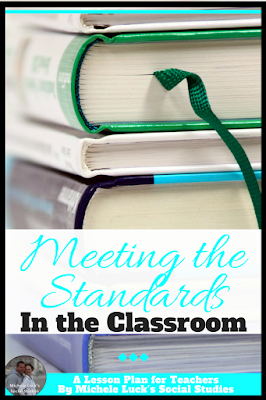Finally, we reach the last standard (this one on reading) in this series on Teaching the Standards in the Secondary Social Studies Classroom! To keeps things simple, I will continue to reference the NCSS and CCSS standards, but keep in mind that we are only using them as an organizational tool, and that the tips provided will help students find greater success in any classroom.
Standard 10 for Social Studies: By the end of grade 10, read and comprehend history/social studies texts in the grades 9–10 text complexity band independently and proficiently.

Teaching the Standards in the Social Studies Classroom
For generations, some Social Studies teachers have stood strong in their claim that it was not their responsibility to teach reading and comprehension; that fell to the Language Arts teachers and, more importantly, on the lower grade levels. Officially, that has changed!
According to our current standards (in most states), Social Studies teachers are responsible for helping students to read and comprehend in their classes. And for those of us that have taught in the History Department for a while, we are singing our praises loud and clear! To us, this single standard finally brings credit and validation to the Social Studies teacher; it is justifying the need for our department in the school building, and reminding everyone that we have a purpose.

How to Teach Reading in the Social Studies Classroom
So, how do we accomplish this task? Simple! Review my blog posts for Standards 1-9, and add one elementary aspect – making sure your content and lesson materials are age, grade level, and reading level appropriate.
Here is where my advice may differ from many in the mainstream. Throughout my teaching and writing career, I have been referred to in many terms:
- A “High Expectations” teacher
- Old School
- A “Rise to the challenge” teacher
- An “If you build it, they will come!” teacher
- A “Raise the bar” teacher
Oftentimes, these were not meant to be compliments! I was called out at faculty meetings for “expecting too much,” and my book was reviewed with the comment, “She sets the bar too high for her students, and I feel sorry for them.”
However, my argument is simple and well proven. I did often introduce materials that were WAY above the current abilities of my students. Sometimes it frustrated them, other times it encouraged them. Most of the time, it led them down a path of curiosity and inquiry that led to their learning. And for those who are “testing” people, my test scores proved my success. More importantly, my students’ achievements in later academic endeavors and in career and life choices says it even better!
Choosing the Reading Materials for Your Lessons
In preparing your lessons and in choosing the materials you will use to teach your content, reach for the stars! Always include reading content that is just a step ahead. Include images and other media to reinforce the reading and assist struggling readers. Allow the students the time and the opportunities to mesh the difficult together with the easy to formulate their best understanding. That will help your students meet this standard, and many other challenges they may face in their lives.
And in addition to the short readings that are used to introduce content in lessons, add novels, news, and magazines. Here are some of my favorites:
- Night by Elie Wiesel when teaching the Holocaust
- Hitler’s Willing Executioners by Daniel Goldhagen, a different perspective on the Holocaust
- Triangle: The Fire that Changed America by David von Drehle for the Progressive Era. I also have tons of great resources for this unit! It’s one of my favorites to teach.
- Lies My Teacher Told Me by James Loewen for U.S. History
- The Jungle by Upton Sinclair for Progressive Era
- National Geographic for any Geography class
- Your local newspaper for any Social Studies class (the obituaries have great lessons!)
- If you have lower level readers, but still want to introduce Social Studies each day, try This Day in History readings with my History Headline News Series. They will help them learn the basic skills in non-fiction analysis.
Wrapping Up
Finally, I want to add one last opinion before I sum up this series on implementing the standards.
Life lessons are not always learned by following the rules. If I had always followed the rules in my teaching career, my students would not have been able to investigate the Holocaust for 3 weeks. They would not have learned more about themselves than they did in any other lesson. If I had always followed the rules, my students would not have been forced to think outside the box. They would not have learned to step away from the norm, and may not have learned the most valuable lessons the world has to offer.
And on this specific standard… If I had not started each school year by using resources WAY BELOW my students’ reading level, they may never have learned to have faith in me and my teaching ability to be able to push the boundaries I so often asked them to push.
“Oh, The Places You’ll Go!” Always the final text reading with my students… And such a valuable lesson inside!

Need Resources to Hit the Reading Skills in Your Classroom?
One thing that really helped my students was the introduction of inquiry-based lessons (even before it was a “thing”). If you need lessons to help you address this skill with your own students, please take a look at the ones I have readily available for most subject areas in the Social Studies classroom. I hope you like them!
Inquiry-Based Resources to help your students practice their reading skills!
For a variety of interactive lessons that can help you to implement this and every standard, please visit my TpT Store. Be sure to check out my Complete Units, including those for World History, U.S. History, Geography & World Religions!
Happy Teaching!
